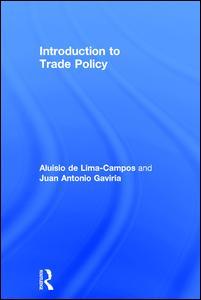Introduction to Trade Policy
Auteurs : Lima-Campos Aluisio, Gaviria Juan

Introduction to Trade Policy provides a comprehensive overview of the rules and regulations that govern trade flow. It discusses the trade policy formulation process of major international economic players, and analyzes existing trade policy tools that countries may resort to in order to take advantage of the benefits of international trade and to protect themselves against its dangers, as well as their implications for trade policy, law and negotiations.
In Section I, the book explores the ways in which interest groups interact with government and legislators to shape trade policies. By developing an analytical view of trade policy formulation systems in the U.S., European Union, the BRICS countries (Brazil, Russia, India, China and South Africa), Canada, Mexico and Australia, the book will help the reader to gain a better understanding of these countries? trade policy developments and also to apply such learning to the analysis of the trade policy formulation of any other countries. Section II goes on to explain how trade policy tools are used by governments to achieve trade and other policy objectives, while Section III analyses trade in services and the multilateral trade rules on Intellectual Property. Finally, Section IV uses hypothetical case studies in simulation exercises to illustrate trade policy decision-making and trade agreement negotiations in a bilateral, plurilateral and multilateral setting.
This is the ideal introduction to international trade policy formulation for students and professionals in the areas of law, politics, economics and public policy who are seeking to develop a global view of international trade, gain insights into trade negotiations and understand the motivations behind the policies and actions of governments regarding international trade issues. This book is also the ideal companion to any traditional legal casebook on international trade or on international economic law.
TABLE OF CONTENTS
SECTION I
TRADE POLICY
CHAPTER 1 – INTRODUCTION TO TRADE POLICY
CHAPTER 2 – THE U.S. TRADE POLICY SYSTEM
CHAPTER 3 – THE E.U.’S TRADE POLICY SYSTEM
Chapter 4 - BRICS Part 1: The Brazilian Policy System
Chapter 5 - BRICS Part 2: The Chinese Trade Policy System
Chapter 6 - BRICS Part 3: The Indian Trade Policy System
Chapter 7 - BRICS Part 4: The Russian Trade Policy System
Chapter 8 – BRICS Part 5: The South African Trade Policy System
Chapter 9 - The Trade Policy System in Other Selected Countries
PART II
TRADE POLICY TOOLS
Chapter 10 – Market Access
Chapter 11 - Trade Remedies
Chapter 12 - Currency Manipulation and Trade
Chapter 13 - Regulatory Measures
Chapter 14 - Dispute Settlement
Chapter 15 - Trade Agreements
Chapter 16 - Advanced Analysis of International Trade Agreements
Chapter 17 - General Agreement on Trade and Services (GATS)
Chapter 18 - The TRIPS Agreement
Chapter 19 - Simulation Exercise - Trade Policy Decision-Making Process
Chapter 20 – Simulation Exercise - Bilateral Trade Agreement Negotiations
Chapter 21 – Simulation Exercise - Plurilateral Trade Agreement Negotiations
Chapter 22 – Simulation Exercise - Multilateral Trade agreement negotiations
Epilogue - Trade Under Attack
List of References
Aluisio de Lima-Campos is an Adjunct Professor at the School of Law at the American University, Washington, D.C., U.S.A., where he teaches courses on trade policy and regional trade agreements in the Trade, Investment and Development Program. He has over 30 years’ experience as a trade policy specialist and economic advisor to the Brazilian Embassy in Washington, D.C., and established the ABCI Institute in 2007, which offers trade policy study and training for Brazilian government and private sector professionals. He is also a former instructor for the Regional Trade Policy courses of the WTO, delivering training to government officials worldwide.
Juan Antonio Gaviria is a Doctor of Juridical Science from American University, the Washington College of Law in Washington, D.C., U.S.A. He holds a LL.M. with an emphasis on International Business Law from the same university and was an Adjunct Professor there for the course on Advanced Issues in International Trade Policy. He has over 15 years’ experience as a legal practitioner in trade and business law and also as a professor and academic researcher. Besides trade law, his main academic interests lie in the intersection of legal and economic topics. He is a tenured Professor and Researcher at Universidad Pontificia Bolivariana, School of Law (Medellín, Colombia) and member of the Research Group on Legal Studies (GRID) at the same university.
Date de parution : 11-2017
15.6x23.4 cm
Date de parution : 11-2017
15.6x23.4 cm
Thèmes d’Introduction to Trade Policy :
- Droit des affaires / droit commercial / droit des sociétés
- Économies et politiques économiques mondiales : relations économiques internationales / douanes, exportation
- Organisation commerciale : commerce, vente, distribution
- Droit, généralités
- Sciences politiques
- droit communautaire / droit européen
Mots-clés :
Caribbean Basin Economic Recovery Act; preferential; WTO Legal Rule; Aluisio de Lima-Campos; SCM Agreement; Juan Antonio Gaviria; SACU Agreement; DSB; Trade Policy Formulation System; Brazilian Trade Policy; Andean Trade Promotion; Antidumping Duties; Plurilateral Trade Agreement; Preferential Trade Agreement; WTO Member; Trade Policy Formulation; Economic Partnership Agreements; Trade Policy System; Trade Remedy Cases; GATT Art; National Treatment Principle; Trip Agreement; Appellate Body; Trade Remedies; Trade Agreement Negotiations; Net Positive Result; Countervailing Duties; MFN Principle



